关于自然资源--英语作文
- 格式:docx
- 大小:15.70 KB
- 文档页数:1
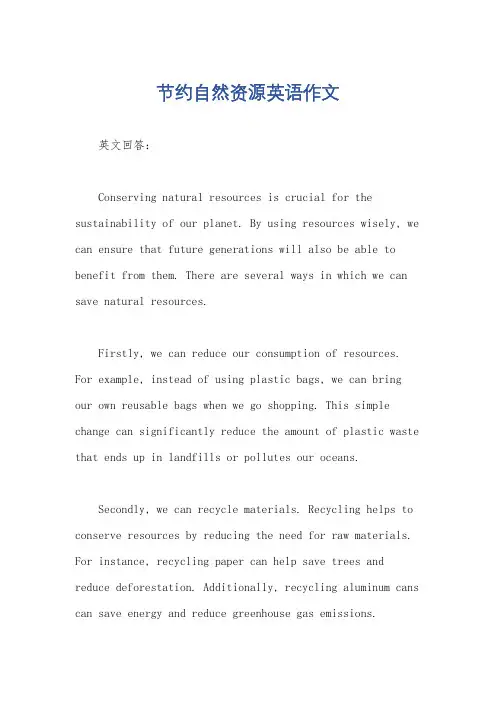
节约自然资源英语作文英文回答:Conserving natural resources is crucial for the sustainability of our planet. By using resources wisely, we can ensure that future generations will also be able to benefit from them. There are several ways in which we can save natural resources.Firstly, we can reduce our consumption of resources. For example, instead of using plastic bags, we can bring our own reusable bags when we go shopping. This simple change can significantly reduce the amount of plastic waste that ends up in landfills or pollutes our oceans.Secondly, we can recycle materials. Recycling helps to conserve resources by reducing the need for raw materials. For instance, recycling paper can help save trees and reduce deforestation. Additionally, recycling aluminum cans can save energy and reduce greenhouse gas emissions.Furthermore, we can conserve water, which is a precious natural resource. Simple actions like turning off the tap while brushing our teeth or fixing leaky faucets can make a big difference. Additionally, using water-efficient appliances and landscaping techniques can also help save water.Moreover, we can promote renewable energy sources. By using solar power, wind power, or hydropower, we can reduce our dependence on fossil fuels, which are non-renewable resources. Investing in renewable energy not only helps to protect the environment but also creates job opportunities and stimulates economic growth.In conclusion, conserving natural resources isessential for the well-being of our planet. By reducing consumption, recycling, conserving water, and promoting renewable energy sources, we can contribute to a sustainable future.中文回答:节约自然资源对于地球的可持续发展至关重要。
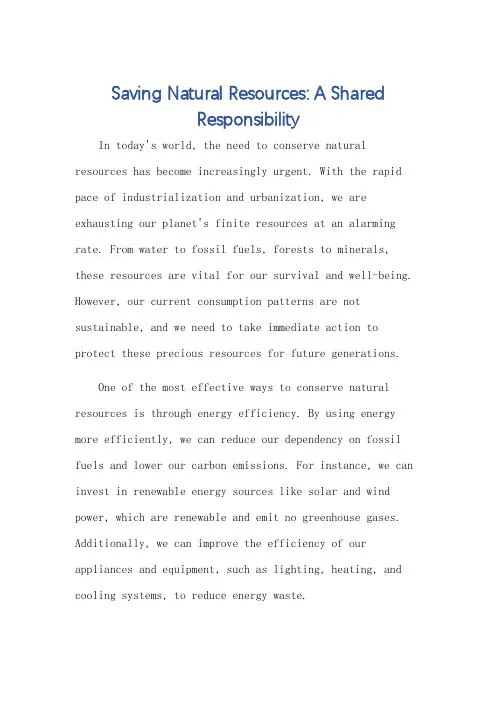
Saving Natural Resources: A SharedResponsibilityIn today's world, the need to conserve natural resources has become increasingly urgent. With the rapid pace of industrialization and urbanization, we are exhausting our planet's finite resources at an alarming rate. From water to fossil fuels, forests to minerals, these resources are vital for our survival and well-being. However, our current consumption patterns are not sustainable, and we need to take immediate action to protect these precious resources for future generations. One of the most effective ways to conserve natural resources is through energy efficiency. By using energy more efficiently, we can reduce our dependency on fossil fuels and lower our carbon emissions. For instance, we can invest in renewable energy sources like solar and wind power, which are renewable and emit no greenhouse gases. Additionally, we can improve the efficiency of our appliances and equipment, such as lighting, heating, and cooling systems, to reduce energy waste.Water conservation is another crucial area. Water is a scarce resource in many parts of the world, and its overuse and waste are leading to serious problems like drought and water scarcity. We can conserve water by fixing leaky faucets and pipes, reducing water usage in our daily lives, and using water-saving appliances and technologies. Additionally, we can promote water-saving practices in agriculture and industries to minimize water waste.Forests are another vital natural resource that needs protection. Forests provide habitats for wildlife, regulate climate, and purify air and water. However, deforestation and forest degradation are happening at an alarming rate due to human activities. To conserve our forests, we need to stop illegal logging and promote sustainable forestry practices. We can also plant more trees and support reforestation efforts to replenish our forests.Moreover, we need to adopt a circular economy approach to resource management. This involves reducing, reusing, and recycling materials to minimize waste and maximize resource efficiency. We can achieve this by implementing waste reduction measures, promoting the use of recyclablematerials, and encouraging companies to adopt sustainable production methods.In conclusion, conserving natural resources is a shared responsibility that requires collective effort and action from all of us. By adopting energy-efficient practices, conserving water, protecting our forests, and promoting a circular economy, we can ensure a sustainable future for ourselves and our planet.**节约自然资源:共同的责任**在当今世界,节约自然资源的需要变得日益迫切。

高考英语作文保护自然资源演讲稿English:As we all know, natural resources are essential for the survival of all living organisms on Earth. However, human activities such as deforestation, overfishing, and the burning of fossil fuels have led to the depletion and destruction of these precious resources. It is high time that we take action to protect and preserve our natural resources for future generations. We can start by reducing our consumption of non-renewable resources, promoting sustainable practices in agriculture and forestry, and investing in renewable energy sources. By doing so, we can ensure a better and more sustainable future for ourselves and for the planet as a whole.中文翻译:众所周知,自然资源对地球上所有生物的生存至关重要。
然而,人类活动,如森林砍伐、过度捕捞和化石燃料燃烧,导致了这些宝贵资源的耗尽和破坏。
现在是我们采取行动保护和保护我们的自然资源以供未来世代使用的时候了。
我们可以通过减少对不可再生资源的消耗,促进可持续的农业和林业实践,以及投资于可再生能源来源来开始。
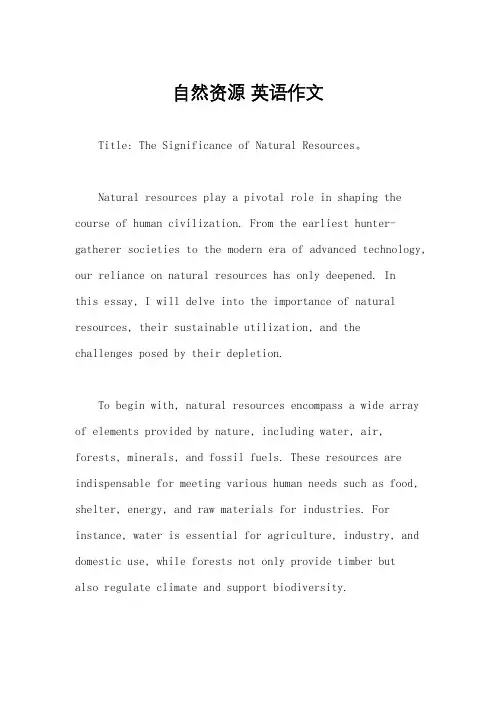
自然资源英语作文Title: The Significance of Natural Resources。
Natural resources play a pivotal role in shaping the course of human civilization. From the earliest hunter-gatherer societies to the modern era of advanced technology, our reliance on natural resources has only deepened. Inthis essay, I will delve into the importance of natural resources, their sustainable utilization, and thechallenges posed by their depletion.To begin with, natural resources encompass a wide array of elements provided by nature, including water, air, forests, minerals, and fossil fuels. These resources are indispensable for meeting various human needs such as food, shelter, energy, and raw materials for industries. For instance, water is essential for agriculture, industry, and domestic use, while forests not only provide timber butalso regulate climate and support biodiversity.One of the key aspects of natural resources is their finite nature. While they are abundant, they are not limitless. This finite nature necessitates responsible management and sustainable utilization to ensure their availability for future generations. Sustainable development involves meeting the needs of the present without compromising the ability of future generations to meet their own needs. Achieving sustainability requires balancing economic, social, and environmental considerations.Furthermore, the depletion and degradation of natural resources pose significant challenges. Overexploitation of resources, such as deforestation and overfishing, can lead to habitat destruction, loss of biodiversity, and ecosystem collapse. Additionally, the burning of fossil fuels for energy contributes to air pollution and climate change, with far-reaching consequences for both the environment and human health.Addressing these challenges requires concerted efforts at the local, national, and global levels. Governments playa crucial role in formulating and implementing policies to promote sustainable resource management, regulate resource extraction, and incentivize renewable energy sources. International cooperation is also essential, particularly in addressing transboundary issues such as climate change and marine pollution.Moreover, technological innovation has the potential to mitigate the pressure on natural resources. Advancements in renewable energy technologies, such as solar, wind, and hydroelectric power, offer sustainable alternatives to fossil fuels. Similarly, innovations in agriculture, such as precision farming and hydroponics, can enhance food production while minimizing environmental impact.Education and public awareness are vital components of fostering sustainable resource management. By raising awareness about the importance of conserving natural resources and the consequences of their depletion, individuals can make informed choices and advocate for policy changes. Encouraging sustainable consumption and lifestyle choices can also help reduce the demand forfinite resources.In conclusion, natural resources are fundamental to human well-being and development. Their sustainable management is essential for ensuring a prosperous futurefor both current and future generations. By adopting a holistic approach that integrates environmental, economic, and social considerations, we can safeguard natural resources for the benefit of all. Only through collective action and responsible stewardship can we preserve the rich diversity of life on Earth.。
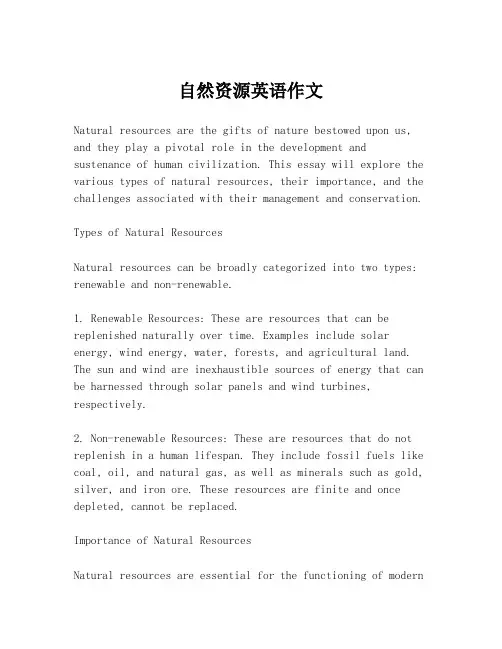
自然资源英语作文Natural resources are the gifts of nature bestowed upon us, and they play a pivotal role in the development and sustenance of human civilization. This essay will explore the various types of natural resources, their importance, and the challenges associated with their management and conservation.Types of Natural ResourcesNatural resources can be broadly categorized into two types: renewable and non-renewable.1. Renewable Resources: These are resources that can be replenished naturally over time. Examples include solar energy, wind energy, water, forests, and agricultural land. The sun and wind are inexhaustible sources of energy that can be harnessed through solar panels and wind turbines, respectively.2. Non-renewable Resources: These are resources that do not replenish in a human lifespan. They include fossil fuels like coal, oil, and natural gas, as well as minerals such as gold, silver, and iron ore. These resources are finite and once depleted, cannot be replaced.Importance of Natural ResourcesNatural resources are essential for the functioning of modernsociety. They are the building blocks of our economy, providing raw materials for manufacturing, energy for transportation and electricity, and food for sustenance.1. Economic Development: Natural resources are the foundation of many industries, from agriculture to mining. They contribute significantly to a nation's GDP and are a source of employment.2. Survival and Quality of Life: Clean water, fertile soil, and a stable climate are vital for human survival. Moreover, access to natural resources like forests and oceans enhances the quality of life by providing recreational opportunities and preserving biodiversity.Challenges in Resource ManagementDespite their importance, the management of natural resources is fraught with challenges.1. Overexploitation: The increasing demand for resources has led to overexploitation, resulting in the depletion of resources and environmental degradation.2. Environmental Impact: The extraction and use of natural resources often have negative environmental impacts, such as deforestation, pollution, and climate change.3. Equitable Distribution: There is an unequal distribution of resources around the world, leading to conflicts and exacerbating poverty in resource-poor regions.Sustainable Use and ConservationTo address these challenges, sustainable use and conservation of natural resources are crucial.1. Sustainable Practices: Adopting sustainable practices in agriculture, forestry, and fishing can help maintain the health of ecosystems and ensure the long-term availability of resources.2. Renewable Energy: Transitioning to renewable energy sources can reduce dependence on non-renewable resources and mitigate the impacts of climate change.3. Legislation and Regulation: Strong laws and regulations are needed to prevent overexploitation and ensure the equitable distribution of resources.In conclusion, natural resources are indispensable to human life and economic prosperity. It is our collective responsibility to manage and conserve these precious resources for the benefit of present and future generations. By adopting sustainable practices and promoting equitable access, we can ensure that the bounty of nature continues to enrich our lives and the planet.。
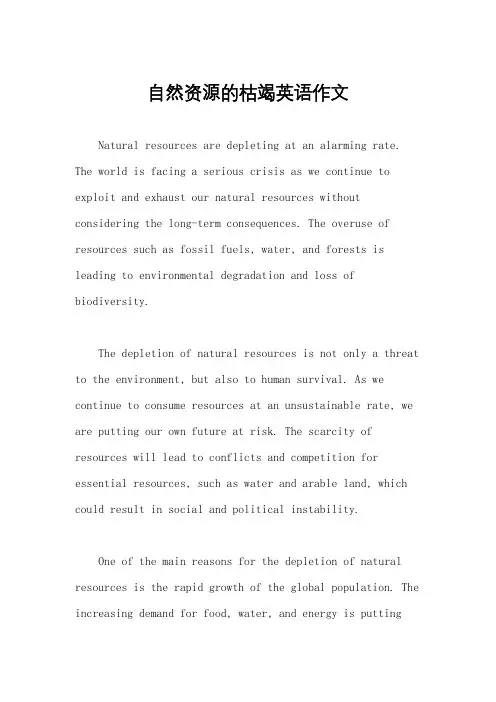
自然资源的枯竭英语作文Natural resources are depleting at an alarming rate. The world is facing a serious crisis as we continue to exploit and exhaust our natural resources without considering the long-term consequences. The overuse of resources such as fossil fuels, water, and forests is leading to environmental degradation and loss of biodiversity.The depletion of natural resources is not only a threat to the environment, but also to human survival. As we continue to consume resources at an unsustainable rate, we are putting our own future at risk. The scarcity of resources will lead to conflicts and competition for essential resources, such as water and arable land, which could result in social and political instability.One of the main reasons for the depletion of natural resources is the rapid growth of the global population. The increasing demand for food, water, and energy is puttingimmense pressure on the environment, leading to overexploitation of resources. Without effective measures to control population growth and consumption, the depletion of natural resources will continue to accelerate.The depletion of natural resources is also exacerbating climate change. The burning of fossil fuels for energy production is releasing greenhouse gases into the atmosphere, leading to global warming and extreme weather events. The loss of forests and other natural habitats is also contributing to the loss of biodiversity and the disruption of ecosystems.To address the depletion of natural resources, it is crucial for governments, businesses, and individuals to take action. This includes implementing sustainable resource management practices, investing in renewable energy sources, and promoting conservation efforts. It is also important to raise awareness about the importance of preserving natural resources and the need for collective action to protect the environment.。
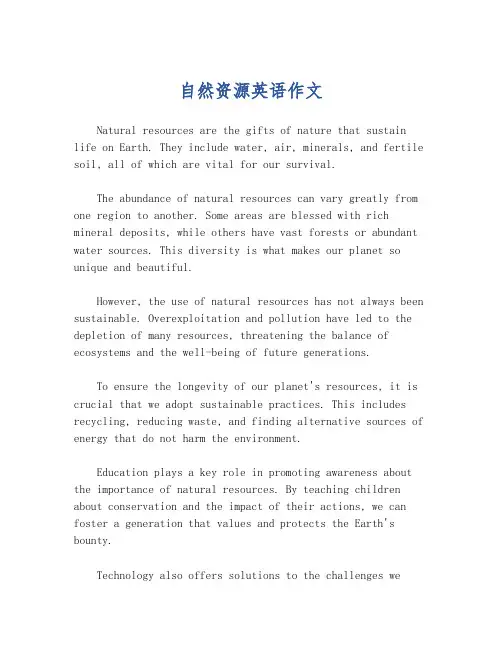
自然资源英语作文Natural resources are the gifts of nature that sustain life on Earth. They include water, air, minerals, and fertile soil, all of which are vital for our survival.The abundance of natural resources can vary greatly from one region to another. Some areas are blessed with rich mineral deposits, while others have vast forests or abundant water sources. This diversity is what makes our planet so unique and beautiful.However, the use of natural resources has not always been sustainable. Overexploitation and pollution have led to the depletion of many resources, threatening the balance of ecosystems and the well-being of future generations.To ensure the longevity of our planet's resources, it is crucial that we adopt sustainable practices. This includes recycling, reducing waste, and finding alternative sources of energy that do not harm the environment.Education plays a key role in promoting awareness about the importance of natural resources. By teaching children about conservation and the impact of their actions, we can foster a generation that values and protects the Earth's bounty.Technology also offers solutions to the challenges weface. Innovations in renewable energy, water purification, and sustainable agriculture can help us use resources more efficiently and reduce our environmental footprint.In conclusion, natural resources are the lifeblood of our planet. It is our collective responsibility to use them wisely and protect them for the generations to come. By working together, we can ensure that the Earth remains a thriving home for all its inhabitants.。
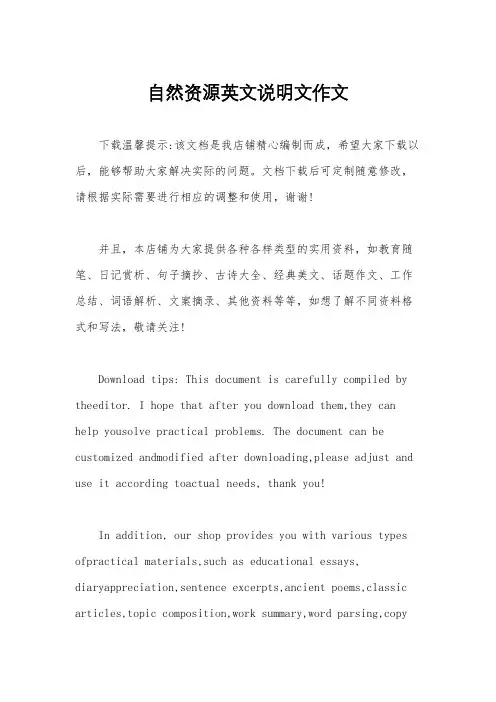
自然资源英文说明文作文下载温馨提示:该文档是我店铺精心编制而成,希望大家下载以后,能够帮助大家解决实际的问题。
文档下载后可定制随意修改,请根据实际需要进行相应的调整和使用,谢谢!并且,本店铺为大家提供各种各样类型的实用资料,如教育随笔、日记赏析、句子摘抄、古诗大全、经典美文、话题作文、工作总结、词语解析、文案摘录、其他资料等等,如想了解不同资料格式和写法,敬请关注!Download tips: This document is carefully compiled by theeditor. I hope that after you download them,they can help yousolve practical problems. The document can be customized andmodified after downloading,please adjust and use it according toactual needs, thank you!In addition, our shop provides you with various types ofpractical materials,such as educational essays, diaryappreciation,sentence excerpts,ancient poems,classic articles,topic composition,work summary,word parsing,copyexcerpts,other materials and so on,want to know different data formats andwriting methods,please pay attention!Natural resources are the gifts of nature that humans use to survive and thrive. They include water, air, minerals, forests, and wildlife. These resources are essential for human life and are used in various ways to meet our needs.Water is one of the most important natural resources. It is used for drinking, bathing, cooking, and irrigation. Without water, life as we know it would be impossible. We must conserve and protect this vital resource to ensure its availability for future generations.Air is another crucial natural resource. It provides us with the oxygen we need to breathe and supports the Earth's climate and weather systems. However, air pollution and deforestation are threatening the quality of the air we breathe, leading to negative impacts on human health and the environment.Minerals such as coal, oil, and natural gas are essential for producing energy and fueling various industries. They are also used in the manufacturing of products we use every day, such as electronics, vehicles, and building materials. However, the extraction and use of these resources can have negative effects on the environment, including habitat destruction and greenhouse gas emissions.Forests are valuable natural resources that provide us with wood, paper, and other materials. They also play a crucial role in regulating the Earth's climate and supporting biodiversity. However, deforestation and illegal logging are threatening the health of our forests and the species that depend on them for survival.Wildlife is an important natural resource that contributes to the Earth's biodiversity and ecosystem stability. It also provides us with food, medicine, and other valuable resources. However, human activities such as poaching, habitat destruction, and pollution are putting many species at risk of extinction.In conclusion, natural resources are essential for human life and well-being. It is our responsibility to use these resources wisely and sustainably to ensure their availability for future generations. By conserving and protecting our natural resources, we can create a more sustainable and healthy planet for all living beings.。
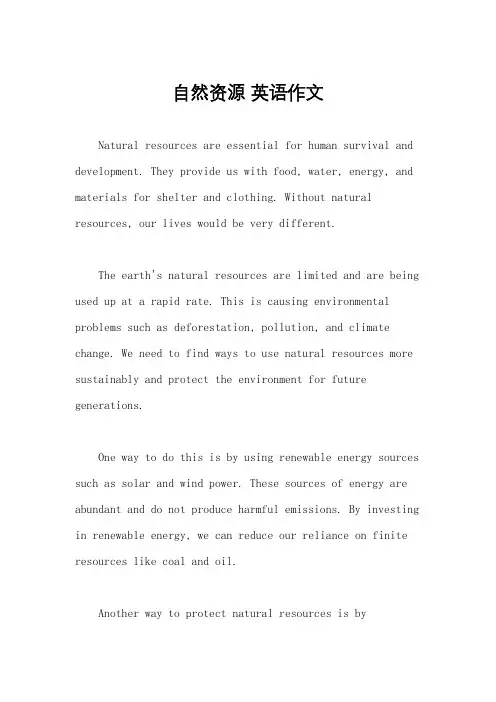
自然资源英语作文Natural resources are essential for human survival and development. They provide us with food, water, energy, and materials for shelter and clothing. Without natural resources, our lives would be very different.The earth's natural resources are limited and are being used up at a rapid rate. This is causing environmental problems such as deforestation, pollution, and climate change. We need to find ways to use natural resources more sustainably and protect the environment for future generations.One way to do this is by using renewable energy sources such as solar and wind power. These sources of energy are abundant and do not produce harmful emissions. By investing in renewable energy, we can reduce our reliance on finite resources like coal and oil.Another way to protect natural resources is bypracticing sustainable agriculture. This involves using farming methods that do not deplete the soil or water supply. By rotating crops, using natural fertilizers, and conserving water, we can ensure that we have enough food to feed the growing population without damaging the environment.Conservation is also important for protecting natural resources. This means using resources wisely and notwasting them. For example, we can conserve water by fixing leaky faucets and using water-saving appliances. We canalso conserve energy by turning off lights and appliances when they are not in use.In conclusion, natural resources are vital for our survival, but they are being used up at an unsustainable rate. We need to find ways to use resources moresustainably and protect the environment for future generations. This will require changes in our energy production, agriculture, and daily habits, but it is necessary to ensure a healthy planet for future generations.。
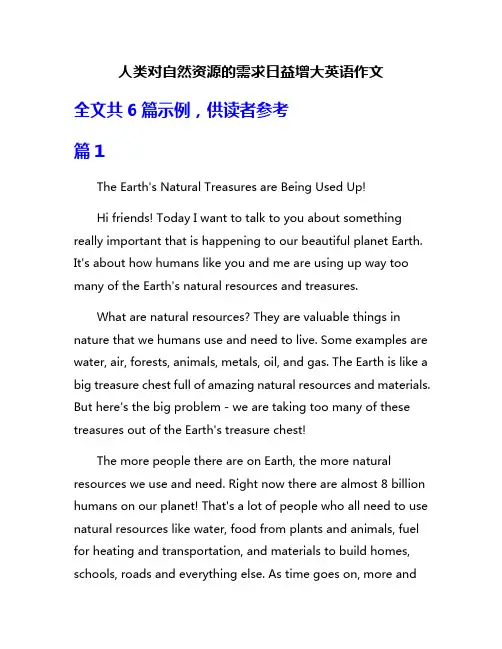
人类对自然资源的需求日益增大英语作文全文共6篇示例,供读者参考篇1The Earth's Natural Treasures are Being Used Up!Hi friends! Today I want to talk to you about something really important that is happening to our beautiful planet Earth. It's about how humans like you and me are using up way too many of the Earth's natural resources and treasures.What are natural resources? They are valuable things in nature that we humans use and need to live. Some examples are water, air, forests, animals, metals, oil, and gas. The Earth is like a big treasure chest full of amazing natural resources and materials. But here's the big problem - we are taking too many of these treasures out of the Earth's treasure chest!The more people there are on Earth, the more natural resources we use and need. Right now there are almost 8 billion humans on our planet! That's a lot of people who all need to use natural resources like water, food from plants and animals, fuel for heating and transportation, and materials to build homes, schools, roads and everything else. As time goes on, more andmore people are being born, which means even more people needing to use natural resources.So why is using up too many natural resources a bad thing? Well, many of these resources are hard to replace and can run out if we use them faster than nature can make more. For example, oil, gas, coal and other fossil fuels come from plants and animals that were buried underground millions of years ago. We can't just make more fossil fuels appear as fast as we are burning them. They will be all gone one day!The same goes for minerals like gold, silver and other metals we dig out of the ground. Once we have mined every last bit of these metals from the Earth, that's it - they're gone unless we find some way to make more. Renewable things like trees, animals, water and air can be replenished through nature's cycles. But if we use too much of them or pollute and disrupt the cycles, it becomes very hard for enough new resources to be naturally made.Using up the Earth's resources too quickly is causing lots of problems for the environment and nature. Cutting down too many trees damages forest habitats for animals. Mining precious metals creates big holes and scars in the earth. Burning fossil fuels releases gases that are changing the climate. Many animalsare going extinct because humans are taking over their habitats to farm, build cities, drill for oil and so on. We have to be much more careful!So what can we do to solve this big resource problem? The most important thing is for all of us humans to try our absolute best to use less stuff and create less waste overall. We have to reduce, reuse, recycle as much as possible! Here are some examples:Turn off lights when not using them to save electricityTake shorter showers to conserve waterWalk, bike or use public transportation instead of driving a gas carRecycle paper, plastic, glass and metal instead of throwing awayBuy secondhand items instead of always buying newPack a litter-less lunch with reusable containersPlant trees, gardens and support parks to help nature renew resourcesThere are so many things each one of us can do to tread more lightly on the planet and not use up resources so quickly. Ifevery person does their part, it will make a huge difference! We also need governments, companies and communities to prioritize environmental protection, renewable energy development, habitat conservation, and sustainable practices.I know reducing our resource usage won't be easy, since humans have gotten very used to our modern lifestyles of convenience. But we absolutely have to find ways to live more simply and in balance with nature before it's too late. The Earth is our one and only home sweet home full of amazing natural treasures. If we aren't very careful, future generations won't be able to enjoy and benefit from these incredible resources like we have.So let's all work together as Earth Protectors to conserve energy, reduce waste, recycle, and respect Mother Nature! Treat every day like it's Earth Day. We need to be on Team Planet and make sure the treasures of the Earth's natural resources can be around and replenished for a very, very long time to come. The future of all life on this planet depends on it!篇2The Human Demand for Natural Resources is IncreasingHi, my name is Jamie and I'm going to tell you about how people need more and more natural resources from the Earth. Natural resources are things that come from nature like water, trees, metals, oil and gas. We use them to make food, build houses, run cars and make all the stuff we need. But the problem is there are more people on Earth than ever before and we all want more and more things. So we have to take more resources from nature and it's causing problems.The first big natural resource is water. We need water to drink, take baths, wash our clothes and dishes, and grow plants for food. Without water we would die! Most of the water comes from lakes, rivers and underground. But a lot of people don't have enough clean water because it gets polluted or there's droughts with not enough rain. Some people have to walk for hours just to get a bucket of water from a well or stream.Then we need trees and plants for food, furniture, paper, medicine and more. Forests are cut down to make space for farms, roads and cities. We're losing so many trees that it's bad for the environment and habitats for animals. It also means less trees to make oxygen for us to breathe. My parents try to recycle paper, plastic and other stuff to save trees but we still need a lot of them.There are also natural resources like coal, oil and natural gas that get burned for energy. They power our lights, heating, cars, planes, factories and more. But burning them pollutes the air and causes climate change. Yet people need more and more energy as the population grows. We have to find cleaner energy like solar, wind and hydroelectric or our planet will get too hot!Metals like iron, copper, aluminum and gold are another key resource. We need them for buildings, cars, phones, computers, cables and wires. Pretty much all our technology and machines need metal! But mining those metals from the ground tears up the landscape and pollutes too. Some metals are starting to run out so we need to recycle more and find newer types.Finally, we need resources like soil and fertilizers to grow our food. As more people need food, we have to transform more land into farms. This means destroying habitats for animals. The fertilizers and pesticides also pollute the water and soil.So you can see there's a huge demand for all these natural resources from the growing human population. We're taking too much from nature and it's causing pollution, habitat loss, climate change and other problems for the planet. We have to try to conserve resources, reduce waste, recycle and find renewableresources that don't pollute or run out. Because all life on Earth depends on having a healthy supply of natural resources!In conclusion, people need more and more water, trees, energy, metals and other resources from nature as our population keeps growing. But taking too many resources is bad for the environment and making the planet sick. We need to be smarter about how we use resources so plants, animals and people can all live happily together on Earth. What can you do to help conserve natural resources? Let me know if you have any other questions!篇3The Hungry Humans and the Disappearing NatureHi friends! Today I want to talk to you about something really important. It's about how us humans are using up way too much of the stuff that nature gives us. You know, like trees, water, coal, oil and all the other cool things the Earth has.I've been learning about this in school and it's pretty scary if you ask me. The teachers say that we humans just keep taking more and more from nature to build our houses, run our cars and factories, and make all the toys, phones and other things welove. But the problem is, nature doesn't have an unlimited supply of these resources.It's kind of like when you go to a birthday party and there's a really yummy cake. At first, everyone takes small slices because they know they have to leave some for others. But then some kids get greedy and start taking bigger and bigger pieces until soon...the cake is all gone! And the kids who were patient end up with nothing. That's kind of what we're doing to nature.Trees and ForestsLet me give you an example with trees. We humans cut down millions of trees every single year to build our homes, furniture, and to make paper. Forests are like the lungs of the Earth that give us the air we breathe. But we're chopping them down faster than the trees can regrow!My teacher showed us pictures of places that used to be green and beautiful forests, but now they're just bare, empty land. All the animals that lived in those woods had to leave because their homes got destroyed. That's so sad! Cutting down too many forests is also bad because trees actually help slow down nasty things like climate change and global warming that are making the Earth hotter. Yikes!Oil and GasAnother resource we're gobbling up too篇4The Growing Demand for Natural Resources by HumansHi there! My name is Sarah and I'm 10 years old. Today I want to talk to you about something really important - natural resources and how us humans use way too many of them!Natural resources are things that come from nature, like water, forests, minerals, oil, and gases. We humans rely on natural resources for lots of stuff - growing food, making products, having clean air to breathe, that kind of thing. But here's the problem: more and more people need more and more natural resources as the years go by. It's kind of like when you're at a birthday party with pizza - the more guests that come, the faster the pizza gets eaten up!Let me give you some examples of how our demand for natural resources just keeps growing and growing. One biggie is energy - we use up tons of oil, gas, and coal to power our homes, businesses, vehicles, and well...pretty much everything! With more people being born every day, we need way more energythan we used to. That's not so good since those fossil fuels take forever to form and we're rapidly running out.Another major resource we can't get enough of is fresh water. We need water for drinking, bathing, growing crops, and making things in factories. But tons of people don't have access to clean water because there's just not enough to go around. Scientists predict that by 2025, two-thirds of the world's population could be facing water shortages! No bueno.Then you have forests, which give us renewable resources like wood, paper, and ingredients for medicine. But we're chopping them down so fast to clear land for farms, homes, and businesses. Lots of critters are losing their homes because of deforestation. In fact, about 18 million acres of forest are cut down each year - that's like 27 soccer fields per minute! Insane.Those are just a few examples, but you get the idea. We humans are using up natural resources at a blistering pace because there are more of us than ever before. We're also developing new technologies that require obscene amounts of stuff like metals, minerals, and fossil fuels to produce.So why is this a problem? Well, for starters, many of these resources are non-renewable, meaning they will eventually run out completely if we keep guzzling them down. Fossil fuels,minerals, metals - once they're gone, they're gone! And we're burning through them way faster than nature can replenish them. No más fossil fuels means no más powering our homes, factories, and cars. Not ideal!Even renewable resources like forests, water, and crops are struggling because we're overworking them. If we don't let them recover, they'll become depleted too. And let's not forget about the toll it's taking on the environment and critters' homes when we pillage these resources.Ultimately, if we don't get our act together soon, we could totally run out of essential stuff we need to survive and maintain our lifestyles as we know it. No fun!The good news is, we can totally do things to conserve natural resources so they can last much longer! Reducing waste, reusing items, and recycling stuff is a great start. We can also use more renewable energy like solar, wind, and water power instead of burning up fossil fuels. Simple things like turning off lights, taking shorter showers, and repairing leaks can save water and energy too. Easy peasy!At school, we've been learning about the 3 R's - reduce, reuse, and recycle. My class did this cool project where we made art out of recycled materials instead of buying new supplies. Weused bottles, cans, cardboard, you name it! It was super fun and we kept a bunch of trash out of landfills. Thought it was just garbage but nope, it became artistic treasure!Governments can also make laws to protect natural resources by limiting pollution, banning over-harvesting, and requiring companies to be more eco-friendly. Individuals can put pressure on businesses to use more sustainable practices too. Every little bit counts when it comes to conserving for the future!Well, that's my two cents on the growing demand for natural resources and why we need to be way smarter about how we use them. The bottom line is, we only have one Planet Earth and its supplies aren't endless, no matter how many of us humans are around. We've gotta learn to live within our means and not be such resource-hogging pigs! The sooner we buck up and start conserving, the longer those precious resources will stick around for me, you, future kids, animals, plants, everyone! Let's get conserving, people!篇5The World Needs More Stuff!Did you know that people all over the world need more and more things made from nature? It's true! We use things from the earth for pretty much everything. Let me tell you all about it.First off, what are natural resources anyway? Those are things that come from nature, like trees, water, animals, rocks, and even the air we breathe. We need natural resources to make food, build houses, power our TVs and phones, and so much more. Without them, we wouldn't have much of anything!As time goes on, there are more and more people living on Earth. That means we need more resources to go around for everybody. It's kind of like if you had 10 kids in your class who all wanted juice boxes for snack time. If 5 more kids joined your class, you'd need way more juice boxes so nobody misses out!The biggest natural resource that everybody needs is water. We drink it, we use it to take baths and showers, we use it to water plants that become our food, and we even use it in factories to make other stuff. But a lot of people don't have clean water to drink or use. That's a big problem we need to fix.Another major resource is oil and gases that we dig out of the ground. They get burned to make energy for our houses, cars, planes, and all the electronics we love so much. As more people want those energy-using things, we need to dig up more oil andgases. The problem is, we're running out of easy places to find them!Then there are resources like trees that give us paper, lumber for buildings, and tons of other wood products. As more forests get chopped down for farms, neighborhoods, and things we buy at stores, we lose areas for trees to grow back. That means less resources in the future.Metals like iron, copper, and aluminum are another huge resource. Every car, bike, phone, plane, and building uses a ton of different metals. More people wanting more of those metal things means more mines have to be dug to get the metals out of the ground. That can hurt nature too.Speaking of nature, as people need more resources, it means disrupting environments where plants and animals live. Their homes could get destroyed for a new mine, farm, or neighborhood. Then the plants and animals lose their homes and might go extinct if they have nowhere else to go. We have to be careful about that.So as you can see, more people on Earth means more demand for all the resources that nature gives us. The tricky part is that there's a limited supply that we can't just endlessly takefrom. We have to be really good at conserving what we have and not wasting resources.What can we do about the growing resource need? For one, we should try to reuse things as much as possible instead of throwing stuff out and getting new stuff. You can also reduce what you use, like turning off lights when you leave a room. And we can recycle things like plastic, paper, and metals so they can get used again instead of mining new ones. Those are the 3 R's - Reduce, Reuse, Recycle!We can also try to make resources last longer through better technology. Like fuel-efficient cars that run farther on less gas. Or new kinds of lightbulbs that give more light but use less electricity. Smart farming can help us grow more food while protecting the environment. There's a lot of room to come up with clever solutions.Individuals can't solve the whole resource crunch, though. Governments of countries need to make smart laws about resource use. Companies need to find ways to make products that don't hurt nature as much. Communities have to develop good recycling and conservation plans. It'll take everybody working together to make sure we have enough resources for the future.The alternative is a world where we've used up too many resources and millions of people struggle to find clean water, food, or energy. We could also see tons of animals and plants going extinct because we've taken over all their homes for our own needs. That's not the kind of world anybody wants to live in!So while I'm just a kid, I hope we can all do our part to manage natural resources better. We should appreciate how lucky we are to have access to so many resources from nature. By being responsible and not wasting them, we can make sure future generations get their fair share too. The world has enough to go around if we're smart about it!篇6The Growing Human Demand for Natural ResourcesHi there! My name is Joey and I'm going to tell you all about how people are using up more and more of the natural resources on our planet Earth. Natural resources are things that come from nature like water, trees, metals, coal, oil and other neat stuff. We use natural resources for all kinds of things every single day!One big way we use natural resources is for energy. Things like oil, gas, and coal are burned to create electricity to power our homes, schools, stores, and factories. We need thatelectricity for lights, heat, air conditioning, computers, TVs, video games and tons of other things. My dad drives a car that runs on gasoline made from oil. Planes, trains, and big trucks also use fuel made from oil and gas to go places. Using these fuels creates pollution, but we need them for transportation.Another huge way we use natural resources is for construction. We cut down trees to get wood for building houses, schools, malls, and other buildings. We also use lots of metals like iron, copper, and aluminum to make buildings, bridges, cars, cans, and zillions of other products. My kid sister loves playing with plastic toys - those are made from oil too! We have to dig big holes in the ground to get all those metals and oil out.Then there's farming and making food products. Farmers need huge amounts of fresh water to grow crops and vegetables. They also need fertile soil and land to plant their seeds. After the plants grow, they get processed into all the yummy foods we eat like bread, cereal, potato chips, candy bars and sodas. Farmers raise cows, chickens, and pigs too so we can have milk, meat, and eggs. I love fried chicken!A lot of products we use every day come straight from nature. Think about paper, rubber, cotton, wood, and tons of ingredients in our medicines, makeup, cleaning supplies andmore. We just can't get enough of that good stuff from Mother Nature!With more and more people being born every day, we need more and more natural resources. Countries with huge populations like China and India are using way more now as their populations get richer and richer. There will be almost 10 billion people on Earth by 2050! That's a crazy number of people who will all want cars, electricity, food, toys, homes and all the cool things we're used to having.But here's the problem - we're running out of a lot of these natural resources! The easy-to-get stuff is basically gone after we've dug it up and chopped it down for hundreds of years. We have to go way deeper in the ground or oceans now to find new supplies of oil, gas and metals. Forests are shrinking from being cut down so fast. Lots of fertile farmland is being ruined by overuse too. Water supplies are running low in many areas with lots of people. Uh oh!If we use up all our natural resources, we're in huge trouble! We won't have enough energy for our homes and transportation. We can't build new buildings or make products. There won't be enough food and fresh water for everyone. No more fishing orcamping in nice natural areas since we'd have wrecked the environment. That's a pretty scary thought if you ask me!So what can we do about this? Well, we have to get way smarter about how we use natural resources. We need to conserve things by not wasting them, recycling as much as possible, and finding other options instead of just taking resources from nature.For energy, we should use more solar, wind, nuclear, and other power sources that don't rely on burning fossil fuels like oil and coal. These cleaner energy sources don't create pollution either. We can drive electric and hybrid cars instead of gas guzzlers. At home, we can save electricity by turning off lights, using efficient bulbs, and not blasting the heat or AC too high.When it comes to metals, woods, and minerals used for construction and manufacturing, we have to reuse and recycle way more than we do now. Companies should try their best to make long-lasting products with recycled materials instead of throwing so much away. Families should buy less stuff we don't really need and be smart about recycling things like cans, bottles, paper and plastic. We can build houses and buildings using more eco-friendly materials too.For food and water, farmers need to find ways to grow more crops using less land and less water through efficient irrigation systems and crop rotation. We should stop wasting ridiculous amounts of food that gets thrown out at restaurants, grocery stores and homes. People in developed countries need to eat less meat too since it takes way more resources to raise animals for food than to grow grains and veggies.Protecting forests, rivers, lakes and oceans is crucial as well. If we keep knocking down trees and overfishing the waters, we're going to lose huge sources of fresh water, fertile soil, and animal life that we depend on. We have to be way better at keeping nature nice and healthy!The bottom line is that we just can't keep gobbling up natural resources at the rate we are now as the population explodes. We're going to run out eventually, and that would be a total disaster for everyone. But if we get smart and find better ways to conserve, recycle, and discover new eco-friendly resources, we can keep growing our awesome modern lifestyles without destroying our planet that we all call home. Let's get cracking on this, people!。
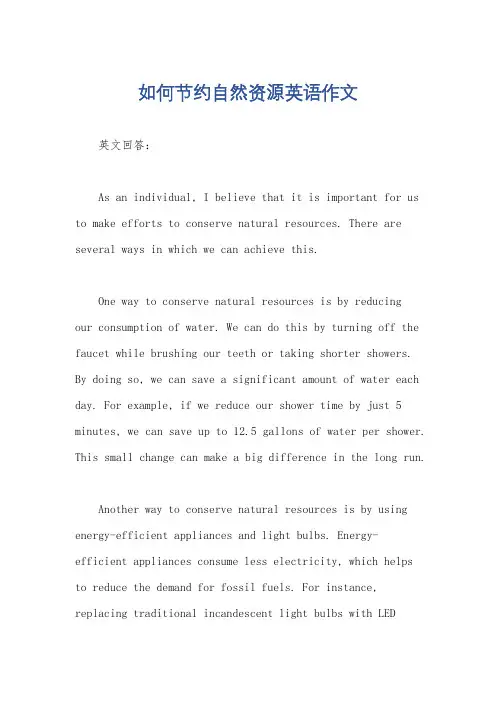
如何节约自然资源英语作文英文回答:As an individual, I believe that it is important for us to make efforts to conserve natural resources. There are several ways in which we can achieve this.One way to conserve natural resources is by reducingour consumption of water. We can do this by turning off the faucet while brushing our teeth or taking shorter showers. By doing so, we can save a significant amount of water each day. For example, if we reduce our shower time by just 5 minutes, we can save up to 12.5 gallons of water per shower. This small change can make a big difference in the long run.Another way to conserve natural resources is by using energy-efficient appliances and light bulbs. Energy-efficient appliances consume less electricity, which helpsto reduce the demand for fossil fuels. For instance, replacing traditional incandescent light bulbs with LEDbulbs can save up to 80% more energy. Not only does this save natural resources, but it also helps to lower our electricity bills.Furthermore, recycling is a great way to conserve natural resources. By recycling materials such as paper, plastic, and glass, we can reduce the need for raw materials and energy-intensive production processes. For instance, recycling one ton of paper can save 17 trees,7,000 gallons of water, and 463 gallons of oil. It is a simple yet effective way to make a positive impact on the environment.In addition to these individual actions, it is also crucial for governments and industries to take responsibility for conserving natural resources. They can implement policies and regulations that promote sustainable practices, such as renewable energy sources and responsible waste management. For example, many countries have set targets to increase the share of renewable energy in their energy mix, which helps to reduce the reliance on fossil fuels.In conclusion, conserving natural resources isessential for the long-term sustainability of our planet. By reducing water consumption, using energy-efficient appliances, recycling, and implementing sustainable practices, we can all contribute to the preservation of our natural resources. Let's make a conscious effort to protect our environment for future generations.中文回答:作为一个个人,我认为我们应该努力节约自然资源。
河流是重要的自然资源英语作文English:Rivers are important natural resources for various reasons. Firstly, rivers play a crucial role in supplying fresh water for human consumption, agriculture, industry, and the environment. They serve as a source of water for irrigation in agriculture, providing a lifeline for farmers to grow crops. Additionally, rivers are also essential for generating hydroelectric power, which is a clean and renewable energy source. The flow of rivers can be harnessed through dams to produce electricity, contributing to sustainable development. Moreover, rivers support biodiversity by creating habitats for a variety of plant and animal species. They serve as corridors for wildlife to migrate and thrive, contributing to the overall ecological balance. Furthermore, rivers serve as transportation routes, enabling the movement of goods and people, fostering economic activities and connectivity between regions. In conclusion, rivers are indispensable natural resources that not only provide water and energy but also support ecosystems, biodiversity, and human livelihoods.中文翻译:河流是重要的自然资源,原因有很多。
英文自然资源介绍作文Natural resources are essential for human survival and development. From the air we breathe to the water we drink, from the food we eat to the materials we use for shelter and clothing, natural resources are all around us and play a crucial role in our daily lives.Forests are a valuable natural resource that provide us with wood for construction, paper for writing, and habitat for countless species of plants and animals. They also play a vital role in regulating the Earth's climate and water cycle.Water is another important natural resource that is essential for all forms of life. It is used for drinking, irrigation, and industrial processes, and also supports a wide variety of aquatic ecosystems.Minerals such as coal, oil, and natural gas are important natural resources that provide us with energy forheating, transportation, and electricity generation. They are also used in the production of countless everyday items, from plastics to pharmaceuticals.Renewable energy sources, such as sunlight, wind, and water, are becoming increasingly important as we seek alternatives to fossil fuels. These natural resources are abundant and sustainable, and can help us reduce ourreliance on non-renewable resources.Biodiversity is a crucial natural resource thatprovides us with food, medicine, and ecological services such as pollination and soil fertility. Protecting and preserving biodiversity is essential for the long-termhealth of our planet and all its inhabitants.In conclusion, natural resources are diverse and essential for our survival and well-being. It is important for us to use these resources wisely and sustainably to ensure that future generations can also benefit from them.。
用列举自然资源的英语作文Water, air, soil, minerals, forests, wildlife, and sunlight are all examples of natural resources. These resources are essential for human survival and provide the raw materials for many of the products we use in our daily lives.The oceans and rivers are rich sources of water, which is vital for drinking, agriculture, and industrial processes. Air is another important natural resource, providing the oxygen we breathe and regulating the Earth's climate. Soil is the foundation for agriculture, providing the nutrients and support for plant growth.Minerals such as coal, oil, and natural gas are valuable natural resources that provide the energy needed to power our homes, businesses, and transportation systems. Forests are also important natural resources, providing timber for construction and paper products, as well as serving as habitats for wildlife.Wildlife, including animals, birds, and fish, are essential components of the natural world and contribute to the balance of ecosystems. Sunlight is a source of renewable energy, providing light and heat for the Earth.Overall, natural resources are the basis of human existence and are essential for maintaining the health and well-being of the planet. It is important to manage and conserve these resources to ensure their availability for future generations.。
自然资源消耗英语作文The Depletion of Natural Resources.Natural resources are the lifeblood of our planet, providing the essentials for sustenance, growth, and development. However, with the ever-increasing demands of a rapidly expanding global population, the depletion of these resources is becoming a grave concern. The unchecked exploitation of natural resources, coupled with wasteful practices and a lack of sustainable development strategies, threatens the future of our planet and its inhabitants.One of the most significant contributors to the depletion of natural resources is the excessive use of fossil fuels. Coal, oil, and gas have been the primary sources of energy for centuries, powering industries, transportation, and domestic uses. However, theirextraction and combustion release harmful emissions into the atmosphere, contributing to climate change and global warming. The burning of fossil fuels is also a finiteresource, meaning that once exhausted, it will no longer be available for future generations.Another critical issue is the deforestation of tropical rainforests, which are rich in biodiversity and play a crucial role in maintaining the earth's carbon balance. The rapid pace of deforestation is primarily driven by the demand for timber, land conversion for agriculture and urbanization, and mining activities. The loss of these forests not only results in the extinction of species but also disrupts the delicate balance of the ecosystem, leading to soil erosion, water scarcity, and climate disruption.Water is another natural resource that is being depleted at an alarming rate. The overexploitation of groundwater, pollution, and poor water management practices have led to water scarcity in many parts of the world. This scarcity not only affects agricultural productivity but also poses a significant threat to human health and survival.Mineral resources such as gold, iron, and other metals are also being rapidly depleted due to their extensive use in various industries. The mining process often involves environmentally destructive practices, such as deforestation, soil erosion, and water pollution. Furthermore, the extraction of these resources often results in the displacement of local communities, leading to social and economic disparities.To address these challenges, it is imperative to adopt sustainable development practices that prioritize conservation, efficiency, and renewable energy sources. Investing in renewable energy technologies such as solar, wind, and hydroelectric power can help reduce the dependency on fossil fuels and mitigate the impact of climate change. Additionally, promoting sustainable agriculture, water conservation, and waste reduction can help conserve our natural resources and protect the environment.Global cooperation and political will are also crucial in addressing the depletion of natural resources.International agreements and treaties, such as the Paris Agreement on Climate Change, provide a framework for countries to work together towards sustainable development goals. By sharing knowledge, technologies, and resources, nations can jointly address the challenges posed by natural resource depletion and ensure a sustainable future for all.In conclusion, the depletion of natural resources is a pressing issue that requires immediate action. By adopting sustainable practices, investing in renewable energy, and fostering global cooperation, we can ensure that ourplanet's resources are used responsibly and preserved for future generations. It is only through collective effort and commitment that we can secure a sustainable and prosperous future for ourselves and our planet.。
----来源网络,搜集整理,仅供参考学习
1
关于自然资源--英语作文
大自然为我们提供了多种方式的资源。几乎所有的事情在我们的
日常生活中,我们使用来自大自然。我们吃的食物,我们喝的水,我
们穿的衣服,水泥和砖建造的房屋,材料,使我们骑自行车,等等,
都来自大自然原本。
人们做了几千年的这些天然用品的使用。随着技术的发展和人口
的增加,材料的数量和所采取的一系列增加。据估计,这种胎面将在
未来几年继续下去。
然而,自然种质资源是没有耗尽。有些资源已耗尽。例如,世界
的燃料资源已经指日可待了。这种必要的,因为水在日常项目的
world.We再也不能草率使用所提供的许多资源,许多地方供不应求。
性质。我们必须学会保护剩下。